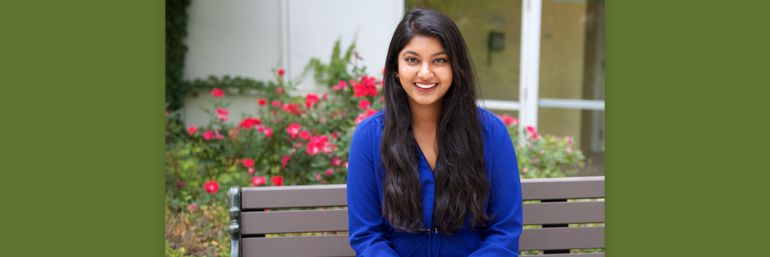Dec 15

Leveraging Social Media for Public Health: Harini Prabhakaran
How can social media be used to help improve public health?
Over the summer of 2020, second-year College of Medicine students Harini Prabhakaran and Hebah Hussain, M.P.H., worked together on a project titled “Evaluating the Social Media Boosted Poll Feature for Surveying Older Adults in Northeast Ohio,” under the mentorship of Amy Lee, M.D., M.P.H., professor of family and community medicine and the program director for the Consortium of Eastern Ohio Master of Public Health program.
Their research was honored by the Association of Physicians of Indian Origin of Northern Ohio (AIPNO), receiving a second-place award in the category of Quality Improvement at the 37th annual AIPNO Gala, held virtually Dec. 5.
Prabhakaran reflects here on her research experience at NEOMED.
This past summer, I reached out to Dr. Amy Lee, the program director for the Consortium of Eastern Ohio Master of Public Health program, to conduct a research project. When Dr. Lee told me about a great project that she was working on, I was excited because it was about using social media for public health! Especially given the pandemic this year, I certainly have realized the importance of social media as means of communication.
Dr. Lee’s project involved learning to leverage social media as a public health tool to engage with the community – both to provide information and to collect data that can be used to assess their needs. Our quality improvement project focused on surveying two Northeast Ohio counties – Stark and Lake – to see if boosting Facebook posts could be an effective way of collecting public health data.
Throughout this project, I was able to work closely with people from different professional backgrounds. I worked with MPH students and members of two public health departments, which taught me how to work in an interprofessional team for a common goal. I was also able to learn different skill sets throughout this project, such as creating computer graphics for the advertisements and setting up survey questions for a social media site – as well as analyzing collected survey data.
Our project will be continued forward by the rest of the team and we are hoping the data will help the health departments communicate better with the residents of their prospective counties. We want social media to be an easy outlet for the departments to use to collect information.
After we finished our project, Hebah and I were able to present our research at AIPNO’s annual gala and research event. AIPNO provided an educational platform to present and share the knowledge we gained from this project. We engaged with peers, ranging from high schoolers to residents, who all presented incredible work on different areas of research. Topics such as nutrition, cardiovascular health, and androgen deprivation therapy were all discussed at this conference. We also were able to network with physicians from Northeast Ohio and listen to their incredible stories about tackling COVID-19. I am grateful to have been a part of this valuable learning experience. Earning this award has only motivated me to continue conducting similar research in the future.
Public health work will always interest me, given my aspirations of becoming a primary care physician and one day working for Doctors without Borders. I want to be able to learn the best way to serve and advocate for my community’s needs. This type of work helps us define the broad and underlying issues facing a community or population – issues that transcend individual health problems – to improve health outcomes.


